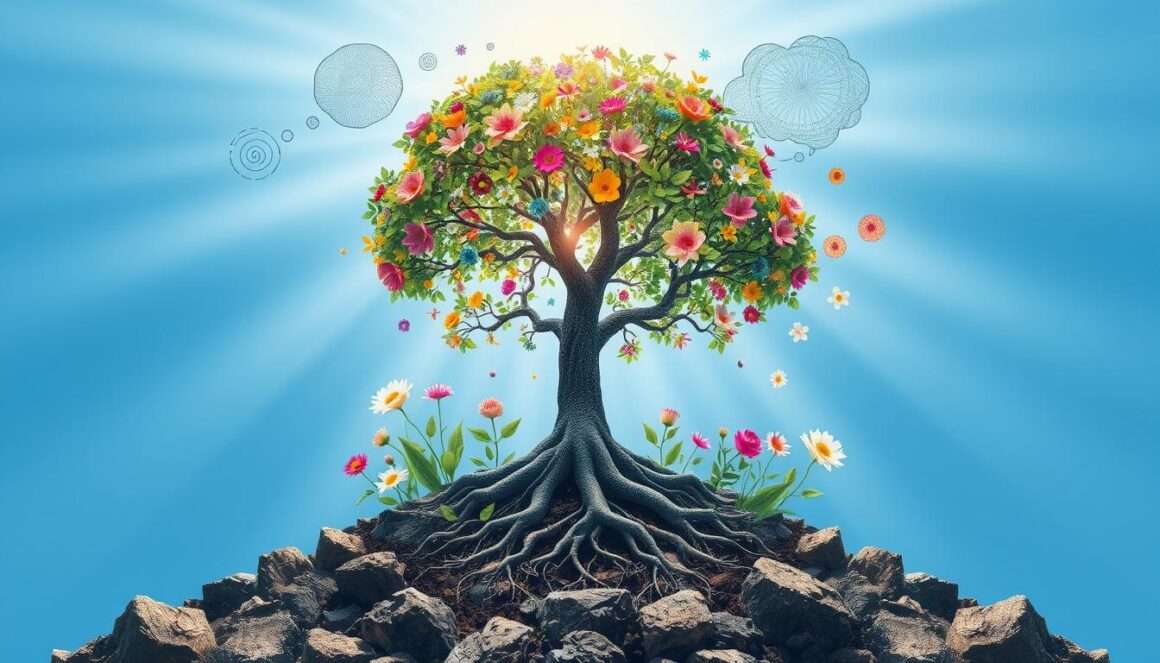The idea of mindset is key in personal and professional growth. It shapes our success and well-being. There are two main mindsets: growth and fixed. Knowing these can help us grow and reach our full potential.
A growth mindset, as Carol Dweck suggests, believes we can improve our abilities with effort. On the other hand, a fixed mindset thinks our qualities are fixed, making us afraid to take risks.

Understanding these mindsets helps us see how they shape our lives. This knowledge can change us, helping us grow and achieve more.
Key Takeaways
- The growth mindset sees challenges as learning opportunities, while the fixed mindset sees them as threats.
- Mindset affects how we learn, respond to feedback, and handle setbacks in life and work.
- Having a growth mindset makes us more resilient, motivated, and in control of our success.
- Mindset can change with effort and practice, making it a flexible trait.
- Knowing how to develop a growth mindset helps us make choices for personal and professional growth.
Understanding the Core Principles of Growth and Fixed Mindsets
At the heart of mindset lies a key difference between two views: growth and fixed mindsets. These mindsets affect how we see intelligence, abilities, and personal growth.
The Psychology Behind Different Mindset Types
The growth mindset believes that skills and talents can grow with effort and learning. People with this mindset see challenges as chances to grow and value feedback for improvement. On the other hand, the fixed mindset thinks abilities are fixed and unchangeable. This leads to avoiding challenges and seeing failures as limits.
Key Characteristics of Each Mindset Pattern
- Growth Mindset:
- Embraces challenges and sees them as opportunities for growth
- Persists in the face of setbacks and views them as learning experiences
- Seeks feedback as a means of improvement
- Believes that effort and hard work lead to success
- Fixed Mindset:
- Avoids challenges to protect one’s ego and self-image
- Gives up easily in the face of obstacles and sees them as a reflection of their limitations
- Sees feedback as a critique of their inherent abilities
- Believes that success is determined by innate talent or intelligence
How Your Mindset Shapes Your Reality
Your mindset greatly influences how you see the world and tackle challenges. A growth mindset makes you resilient and open to learning. It encourages taking risks and persevering through tough times. In contrast, a fixed mindset limits your outlook, making you defensive and less open to growth.
“The greatest weapon against stress is our ability to choose one thought over another.” – William James
Grasping the basics of growth and fixed mindsets is key to personal and professional growth. By adopting a growth mindset, we can reach our full potential and see the value in learning and growth.
The Science Behind Mindset Development
The idea of mindset, especially the growth vs. fixed mindset, has caught the eye of scientists. A lot of research has shown how our mindsets work. It affects our personal and work lives.
At the heart of mindset theory is neuroplasticity. This means our brains can change and make new connections as we live. Our experiences, beliefs, and brain paths shape our mindsets.
People with a growth mindset show more brain activity when facing challenges. This lets them see obstacles as chances to learn and grow. It helps them develop and improve.
On the other hand, those with a fixed mindset see challenges as threats. This makes it hard for them to solve problems and learn new things. It limits their growth and success.
The good news is, mindsets can change. With the right practice and effort, we can shift to a growth mindset. Knowing how mindsets work helps us grow and improve our lives.

| Characteristic | Growth Mindset | Fixed Mindset |
|---|---|---|
| View of Intelligence | Malleable and can be developed through effort and learning | Static and unchangeable |
| Response to Challenges | Embraces challenges as opportunities for growth and improvement | Avoids challenges and sees them as threats to be avoided |
| Persistence | Persists in the face of setbacks and views failure as a chance to learn | Gives up easily and views failure as a reflection of their abilities |
| Feedback Orientation | Seeks out and welcomes feedback as a tool for improvement | Defensive and resistant to feedback, perceiving it as a criticism |
Understanding mindset science lets us grow and improve our lives. It’s a journey of learning and getting better.
Key Differences Between Growth and Fixed Mindsets in Daily Life
The difference between growth and fixed mindsets is clear in daily life. Those with a growth mindset see challenges as chances to learn and grow. On the other hand, those with a fixed mindset see them as threats to their self-image.
Response to Challenges and Obstacles
People with a growth mindset view obstacles as temporary hurdles. They believe they can be overcome with effort and persistence. They are open to taking risks and learning from mistakes.
Those with a fixed mindset, however, tend to shy away from challenges. They fear failure will show they are not capable.
Attitude Toward Learning and Development
Those with a growth mindset are always looking to learn more. They see learning as a lifelong journey. They welcome feedback and work to improve themselves.
Individuals with a fixed mindset, on the other hand, believe their abilities are fixed. They are less likely to invest time and effort in personal growth.
Handling Feedback and Criticism
People with a growth mindset see feedback as a chance to get better. They separate their self-worth from their performance. They use criticism to grow.
Those with a fixed mindset, however, often see feedback as a personal attack. They may become defensive or dismissive.
Knowing the differences between growth and fixed mindsets can help us navigate our daily lives better. It can lead to more success in both personal and professional areas.

| Growth Mindset | Fixed Mindset |
|---|---|
| Embraces challenges as opportunities for learning | Avoids challenges, fears failure |
| Sees mistakes as a chance to improve | Perceives mistakes as reflections of their abilities |
| Seeks feedback for personal growth | Reacts defensively to feedback and criticism |
| Believes abilities can be developed through effort | Believes abilities are static and unchangeable |
Common Barriers to Developing a Growth Mindset
Starting a growth mindset journey can be tough. A big hurdle is the scarcity mindset. This is believing that there’s not enough to go around. It makes people afraid, doubt themselves, and not want to try new things.
Another big obstacle is talking badly to oneself. Many people are too hard on themselves. They always criticize themselves for not being good enough or for past mistakes. This kind of thinking makes it hard to see the value in learning and growing.
- What society and culture teach us also affects our mindset. In some places, failing is seen as a bad thing. People focus more on getting things right away than on learning and getting better.
- Not being able to bounce back from hard times is another barrier. People with a fixed mindset might give up when things get tough. But those with a growth mindset keep going and learn from their mistakes.
To get past these obstacles, we need to work hard. We must question our beliefs, change negative thoughts, and learn to adapt to challenges. By adopting a growth mindset, we can reach our full potential and grow in many ways.

“The future belongs to those who believe in the beauty of their dreams.” – Eleanor Roosevelt
How Your Mindset Influences Success and Achievement
Your thoughts can deeply affect your success in life. This includes your career, personal relationships, and school grades. Your mindset is key in shaping what you achieve.
Impact on Career Development
A growth mindset helps you advance in your career. People with this mindset tackle challenges head-on. They see feedback as a chance to get better.
This mindset makes you more resilient and adaptable. It often leads to better job performance, more promotions, and job satisfaction.
Effects on Personal Relationships
Your mindset also affects your personal life. A 2b mindset makes relationships stronger and more rewarding. These people are open to talking, understanding, and finding common ground.
This openness builds deeper connections with loved ones and friends.
Role in Academic Performance
Mindset also matters in school. Students with a growth mindset face challenges head-on. They see mistakes as chances to learn and grow.
This mindset boosts grades, keeps students engaged, and makes learning more enjoyable.
In short, your mindset greatly influences your success in life. By adopting a growth mindset, you can reach your full potential. This will improve your personal and professional life.

Practical Strategies for Shifting from Fixed to Growth Thinking
Changing from a fixed to a growth mindset is a big shift. It changes how you see challenges. Here are some ways to grow your mindset:
- Practice Mindfulness: Try meditation or deep breathing to notice your thoughts. This helps you spot and question fixed mindset thoughts.
- Embrace Challenges: See tough tasks as chances to learn and grow. Be curious and ready to work hard to get better.
- Reframe Your Language: Watch what you say about yourself. Swap “I can’t do this” for “I’m not there yet, but I’ll keep trying.”
Setting achievable goals and checking your progress helps too. Remember, growing your mindset is a long journey. It needs time and effort to really change how you think and act.
| Fixed Mindset | Growth Mindset |
|---|---|
| Avoids challenges | Embraces challenges |
| Gives up easily | Persists in the face of setbacks |
| Sees effort as fruitless | Views effort as the path to mastery |
| Ignores feedback | Learns from feedback |
| Feels threatened by the success of others | Finds inspiration in the success of others |
By using these strategies and questioning your fixed mindset, you can grow. This growth mindset will help you reach your goals and succeed in many areas of life.
“The true measure of success is how many times you can bounce back from failure.” – Stephen Richards
The Role of Mindset in Personal Development
Developing a growth mindset is more than just success. It’s a journey that changes us deeply. With a growth mindset, we become resilient, make lasting changes, and reach our full potential.
Building Resilience Through Mindset Work
A growth mindset lets us see challenges as chances to learn and grow. It helps us bounce back from tough times with strength and determination. This resilience is key to growing and changing in life.
Creating Lasting Behavioral Changes
Real personal growth needs more than quick fixes. A growth mindset helps us make lasting changes. It lets us believe in our ability to grow and change, adopting new habits and breaking free from old ways.
The impact of mindset on personal growth is huge. Embracing a growth mindset opens the door to resilience, transformation, and fulfillment. It’s a journey of self-discovery and growth.
Real-Life Success Stories of Mindset Transformation
The power of a growth mindset is clear in the success stories of many. These stories show how changing one’s perspective can lead to great achievements. They prove that a growth mindset can change lives for the better.
Oprah Winfrey, a famous media mogul, is a great example. She went from a tough childhood to becoming a huge influence. Oprah says, “The biggest adventure you can take is to live the life of your dreams.” Her mindset helped her overcome hard times and keep improving herself.
“Challenges are gifts that force us to search for a new center of gravity. Don’t fight them. Just find a new way to stand.”
J.K. Rowling, the Harry Potter author, is another inspiring story. She went from being a single parent to a famous author. Rowling says, “It is our choices that show what we truly are, far more than our abilities.”
These stories show that a growth mindset can help people reach their full potential. They prove that success is possible in both personal and professional life.
| Individual | Mindset Transformation | Key Achievements |
|---|---|---|
| Oprah Winfrey | From a challenging childhood to becoming a media mogul and philanthropist | Built a multi-billion dollar media empire, influential public figure, philanthropist |
| J.K. Rowling | From a struggling single parent to a globally renowned author | Created the beloved Harry Potter series, which has sold over 500 million copies worldwide |
Tools and Techniques for Mindset Training
Building a growth mindset is a journey that never ends. It needs constant practice and looking inward. Luckily, many tools and methods can help you improve your mindset and see your progress.
Daily Practices for Mindset Enhancement
- Mindfulness meditation: Spend a few minutes each day practicing mindfulness meditation. It helps you stay in the moment and think positively.
- Journaling: Write down your thoughts, feelings, and experiences regularly. It helps you understand your mindset better and find areas to improve.
- Positive affirmations: Say empowering statements to yourself, like “I embrace challenges as opportunities to learn and grow.” It helps keep a growth mindset.
Measuring Your Mindset Progress
It’s important to track your mindset progress. This keeps you motivated and shows that your hard work is paying off. Here are some tools and methods to help you measure your growth:
- Mindset assessment surveys: Take online mindset assessments to understand your mindset at the start and see how it changes over time.
- Personal reflection: Look back at your journal entries or other self-reflective practices. It helps you see changes in your thoughts, actions, and outlook.
- Feedback from others: Ask trusted friends, family, or colleagues for their thoughts on your mindset growth. Their outside view can be very helpful.
The path to a growth mindset has ups and downs. But with regular use of these tools and techniques, you can develop a lifelong love for learning. You’ll also become more resilient when facing challenges.
The Impact of Environment on Mindset Formation
Our environment greatly affects our mindset. It shapes our beliefs and attitudes from home to work. Knowing how our surroundings influence our growth mindset definition is crucial for success and growth.
Children who explore and learn from mistakes tend to have a growth mindset. On the other hand, those who fear failure often have a fixed mindset. This shows how our upbringing matters.
Places that value learning and progress help foster a growth mindset. When we’re in a culture that loves learning, we’re more open to challenges. We see failures as chances to get better.
| Factors Influencing Mindset Formation | Growth Mindset Environment | Fixed Mindset Environment |
|---|---|---|
| Family Upbringing | Encourages exploration and risk-taking, celebrates effort and progress | Emphasizes perfection, discourages mistakes, and focuses on natural talent |
| Educational System | Promotes continuous learning, provides constructive feedback, and celebrates improvement | Focuses on test scores, grades, and competition, discourages asking for help |
| Workplace Culture | Fosters a culture of learning, embraces challenges, and values employee development | Emphasizes individual performance, avoids discussing weaknesses, and promotes a rigid hierarchy |
We can shape our environment to foster a growth mindset. This might mean pushing for changes in schools and workplaces. It also means choosing the right people and activities for our lives.
The growth mindset definition is not just about us. It’s also about the systems we’re in. By understanding this, we can change our surroundings. This unlocks our potential for lifelong learning and success.
Using Growth Mindset Principles in Leadership and Teaching
As leaders, managers, and educators, we have a big role to play. We can shape the mindsets of those around us. By using growth mindset principles, we can create a culture of learning and growth.
A growth mindset believes that skills and intelligence can grow with effort. We can show this by being examples ourselves. We should give feedback that helps and celebrate every step forward.
When we foster a growth mindset, we unlock people’s true potential. Those who believe they can grow are more likely to aim high and keep going, even when it’s tough. This leads to more engagement, creativity, and success for everyone.
FAQ
What is a growth mindset?
A growth mindset believes you can improve your skills and intelligence with effort and learning. It’s the opposite of a fixed mindset, where you think your abilities are unchangeable.
What is the difference between a growth mindset and a fixed mindset?
A growth mindset sees challenges as chances to learn and grow. A fixed mindset sees them as threats. People with a growth mindset welcome feedback and see failure as a learning opportunity. Those with a fixed mindset often try to prove themselves and avoid showing weaknesses.
How can I develop a growth mindset?
To develop a growth mindset, try these strategies: – Challenge yourself and seek out learning opportunities. – View mistakes and failures as chances to learn. – Be open to feedback and constructive criticism. – Celebrate your progress and improvements, not just achievements. – Surround yourself with people who support growth and development. – Practice positive self-talk and challenge negative thoughts.
What are the benefits of having a growth mindset?
A growth mindset offers many benefits, including: – Increased resilience and ability to bounce back from setbacks. – Greater willingness to take on challenges and try new things. – Improved problem-solving and adaptability. – Enhanced learning and skill development. – Higher levels of achievement and success. – Better relationships and interpersonal skills. – Reduced stress and anxiety.
How can a growth mindset be applied in the workplace?
In the workplace, a growth mindset can greatly benefit both individuals and the organization. It can lead to: – A culture of continuous learning and improvement. – Encouraging employees to take on new challenges and seek feedback. – Providing opportunities for skill development and training. – Recognizing and rewarding effort and progress, not just results. – Embracing failures and mistakes as learning opportunities. – Promoting collaboration and a team-oriented approach to problem-solving.

